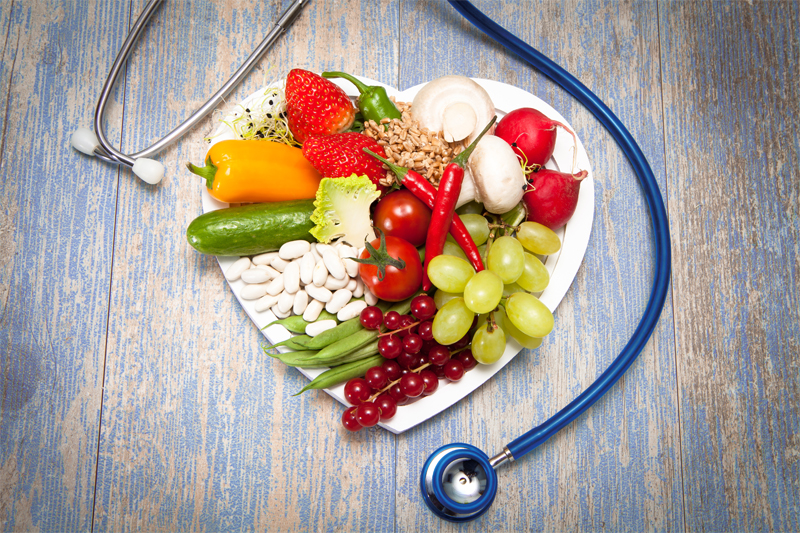
Many professionals recommend a diet rich in olive oil, red apples, salmon, avocadoes, and other naturally abundant foods to ensure the longevity of your heart. Here’s a list of natural foods you should incorporate in your diet to keep your heart alive and kicking, well into old age.
1. Red Apples
The health benefits of apples are vast. Red apples share a close link with lower incidences of heart diseases. This is mainly owing to the many compounds found in its composition that improve heart health. Red apples are rich in a phytochemical called quercetin, which is an essential anti-inflammatory agent and slows down the formation of blood clots.
Apples also contain a treasure trove of soluble fiber and polyphenols which shield the body against bad cholesterol and provide a host of antioxidant effects. Particularly, the polyphenol epicatechin has been known to lower blood pressure, reduce bad cholesterol, and decrease the risk of stroke.
You can have an apple in a variety of dishes. Coupling it with a handful of walnuts or cashews will make a healthy and tasty snack.
2. Olive Oil
A study published in the New England Journal of Medicine found that the Mediterranean diet has many potential benefits for adults suffering from a high risk of heart diseases. One of the most integral components of this diet is olive oil. Olive oil improves cardiovascular health, mainly by raising good LDL cholesterol and lowering bad HDL cholesterol.
Olive oil may also put a stop to the aging of the heart. In 2011, the American Journal of Clinical Nutrition published a study which revealed that diets containing reasonable amounts of oil reduced endothelial dysfunction and damage. The endothelial layer is present in the arterial walls and plays a pivotal role in streamlining blood flow.
You can use olive oil as a salad dressing or cook your meals in its rich and nutritious presence — the choices are endless.
3. Avocados
Avocados are lined with monounsaturated fatty acids in their molecular structure, just like olive oil. Plus, they also contain phytochemicals, essential vitamins, and a host of antioxidant compounds that collaborate to protect your heart from an array of potential diseases. A notable monounsaturated fatty acid in avocadoes is oleic acid. Oleic acid is famous for its anti-inflammatory properties.
Besides, avocado oil is an excellent resource for cooking because it can easily combat heat-resistant oxidation, a process which denatures some good fats and makes them harmful for you at a specific high temperature.
4. Salmon
One of the best natural sources of long-chain omega-3s, DHA and EPA, is salmon. EPA and DHA have a longstanding scientific history of lowering inflammation and blood pressure and improving the functional capacity of endothelial cells in the body.
One 2012 study found that only 3 ounces of salmon (.5 to 4.5 grams of omega-3s) can significantly improve arterial function and streamline the blood flow in the human body.
Salmon is delicious and doesn’t have the strong fishy taste that other fatty fish such as sardines do. And you can prepare it in various ways — smoked, grilled, steamed, or sautéed.
5. Whole Grains
Whole grains have a high nutrient content of fiber, vitamins, minerals, and other compounds which lower triglycerides and LDL cholesterol. This keeps your heart in splendid shape. Oats are superfoods. They contain beta-glucan, a soluble fiber, which lowers total cholesterol levels in the body. American Journal of Nutrition found through a study in 2015 that whole grain oats might have a life-changing effect on reducing blood cholesterol levels.
You can make a mouth-watering sandwich with 100 percent whole-grain bread, some avocados, sliced tomatoes, lettuce, and a spoon of peanut butter. And if you have a thing for Italian recipes, consider switching from white pasta to whole-wheat pasta.
6. Red Wine
Red wine also contains a family of polyphenols that can work wonders for your heart health. Studies show that consumption of red wine in recommended doses can prevent cardiovascular disease by supplying a rich vein of antioxidants, improving endothelial function, reducing the adverse conditions of blood palette activity, and increasing good cholesterol.
However, the key to enjoying red wine is moderation. To keep yourself on the safe side, you can try the dealcoholized version of red wine. The dealcoholized version provides the same range of health benefits that red wine is famous for.
Takeaways
You can easily make healthy foods, such as olive oil, avocados, oats, and apples, an essential part of your diet. This inclusion will play a huge role in preventing cardiovascular diseases, high cholesterol, and other dangers associated with a diet deficient in the important nutrients mentioned above.
Following the tips above, along with getting certified in Basic Life Support from an qualified provider of ACLS, PALS, and BLS certifications can help you to not only keep your own heart healthy, but be prepared to help others experiencing a cardiac emergency.
Comments
comments